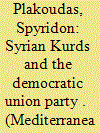|
|
|
Sort Order |
|
|
|
Items / Page
|
|
|
|
|
|
|
| Srl | Item |
| 1 |
ID:
145267


|
|
|
|
|
| Summary/Abstract |
In the aftermath of the Arab Spring the Middle East has plunged into a state of instability. The United States has responded to these rising insecurities in a region of strategic importance with hesitation or half-hearted commitments. The Obama administration, plagued by the increasingly difficult decision of defining America's role in an apolar world while managing the political and economic legacy of the Bush administration, has relied on a policy of delegation. Obama neither refrained from military options nor showed any willingness to commit American ground troops to one of the strategically and operationally most complex environments of the world. Instead, Obama's preferred way of war is one relying on surrogates—both human and technological—that allow the United States to externalize, partially or wholly, the strategic, operational and tactical burden of warfare. Unlike any other previous US administration surrogate warfare has become the principal means of protecting US interests in the Middle East that are perceived to be all but vital. The need for deniability and legitimacy, cost–benefit considerations as well as the lack of capability have made warfare by surrogate a preferred option in the Middle East. The consequences for US policy in the region are profound, as the lack of control and oversight have empowered surrogates whose long-term interests are not compatible with those of the United States. More severely, the US might have jeopardized its standing as the traditional guarantor of security in the Middle East— something that partners and adversaries alike have exploited.
|
|
|
|
|
|
|
|
|
|
|
|
|
|
|
|
| 2 |
ID:
110970


|
|
|
|
|
| Publication |
2012.
|
| Summary/Abstract |
When Barack Obama took the oath of office three years ago, no one associated the phrase "targeted killing" with his optimistic young presidency. In his inaugural address, the 47-year-old former constitutional law professor uttered the word "terror" only once. Instead, he promised to use technology to "harness the sun and the winds and the soil to fuel our cars and run our factories.
|
|
|
|
|
|
|
|
|
|
|
|
|
|
|
|
| 3 |
ID:
145566


|
|
|
| 4 |
ID:
138746


|
|
|
|
|
| Summary/Abstract |
The Obama administration is often criticized for not having a strategic vision. After more than six years in office, a high expectation that was widely shared around the globe seems to have nearly evaporated. Many see the “disorder” the world is facing today as partly a result of a lack of vision from the White House. You could make a case that the emergence of the Islamic State (IS) and other “violent extremism” in the Middle East and beyond, Russia's aggression in Ukraine, chaos in Syria, China's assertive moves in the East China Sea and South China Sea, and so forth, are results, direct and indirect, of a perceived vacuum created by “American withdrawal.” However, the Obama administration's understanding of the world has been surprisingly positive and constant. This paper will argue that Obama administration in fact has a core world view, based on a new self-image of the United States, and that the issue is not whether the administration lacks a vision; rather the focus should be on the vision itself and the execution of that vision.
|
|
|
|
|
|
|
|
|
|
|
|
|
|
|
|
| 5 |
ID:
154172


|
|
|
|
|
| Summary/Abstract |
By June 2016, the Kurds of Syria (just 12 percent of the country's total population) controlled almost all of the 822-kilometer Turkish-Syrian border and advanced against Manbij and Raqqa — the Islamic State's resupply center and capital, respectively. How did the Syrian Kurds grow from pariahs to kingmakers in northern Syria? This essay surveys the strategy of the Democratic Union Party (PYD), the most powerful organization among the Syrian Kurds, from 2011 until the first half of 2016, and shows how the PYD's realpolitik secured the party's survival and, eventually, success in the midst of a vicious sectarian civil war.
|
|
|
|
|
|
|
|
|
|
|
|
|
|
|
|
|
|
|
|
|